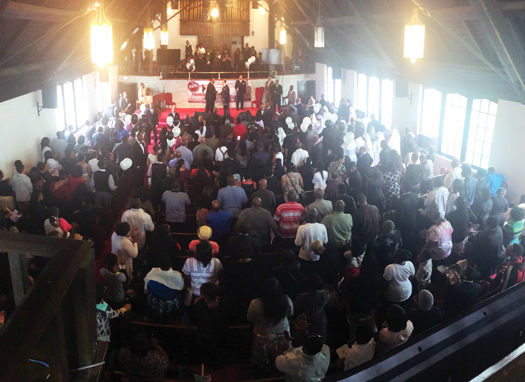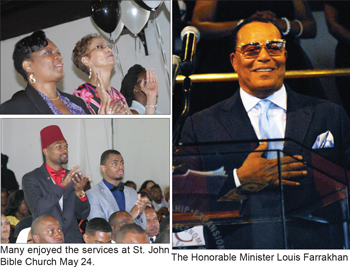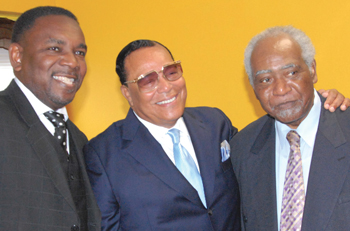Becoming one in Christ - Farrakhan's message of unity transcends religious boundaries
By Ashahed M. Muhammad -Assistant Editor- | Last updated: May 29, 2015 - 10:26:31 AMWhat's your opinion on this article?

An overhead shot of the crowd at St. John Bible Church on Chicago’s West Side May 24. Photo: Haroon Rajaee
|
CHICAGO - The Honorable Minister Louis Farrakhan said he felt right at home speaking from the pulpit at Greater St. John Bible Church on the city’s West Side May 24.
As a believer in the oneness of God, no one should be confused by a Muslim speaking at a church, he noted. Although the church’s pastor said some expressed concern when they heard Min. Farrakhan was invited to speak because “he wasn’t a Christian,” the pastor courageously invited him anyway. The Minister briefly addressed their concerns during his introduction.
“I beg to differ with you, I think I’m more of a Christian than most who think they are, and when we finish here today, I think you will understand what I mean,” said the Minister. “Anywhere that Christ’s name is mentioned and honored, and loved, I feel welcome.”

(L) Photo: Photo: Tim 6X (R) Photo by Haroon Rajaee
|
“We are filled with misunderstanding because a devil has come between us. God is not the author of confusion, he is the author of peace,” said Min. Farrakhan. “Perceptions vary because we are human beings. We can look at a thing and see it our way, and another can look at the same thing and see it their way, and sometimes we differ.”
An important part of the scriptures is when Jesus asked his disciples, “Who do they say I am?” and then more specifically he asked, “Who do you say I am?” This shows Jesus had not been telling the people who he was he just did what God commanded.
“When a man works among you but does not tell you who he is, then when you consider his works, his works will testify of him,” said Min. Farrakhan.
Peter then answered: “Thou art the Christ, son of the living God.” Jesus quieted because it was not yet time for his true identity to be revealed. It was not until he ascended to the right hand of The Father God, that he became the Christ.
“From that position, he guided his disciples and they became apostles,” the Minister said.
“While Christ was on Earth, he had a rough time,” the Minister noted. “It is easy to follow him now, because you weren’t living in ancient Rome. He had enemies that hated him because he realized the synagogue was full of hypocrites—he said they were like whited sepulchers but in them were the bones of dead men,” he added.
He then emphasized the point using the example of the choir’s songs and those who come to church. The songs were unifying, they sang together, were in tune and filled with the spirit.
“But after the song is done and after the word is preached, what do you go back home to? Who are you when you leave this house? Are you really a Christian?” the Minister asked. “The cross around your neck doesn’t make you a Christian. Praising his name is a good start in the right direction, but if all you do is praise his name but won’t live the life that he taught, then you are in need of further teaching,” he said.
The current condition Blacks find themselves in is due to the system of White Supremacy. Black minds were shaped by their enemies while their bodies were used during slavery. Blacks were not even allowed to read the Bible. It was not until the late 1700s slave masters determined that it was acceptable for Blacks to be Christians and slaves at the same time, however, they were only to be taught by those they had already sanctioned and approved.
“God doesn’t make niggers, but somebody is a nigger maker!” said the Minister. “Jesus doesn’t make niggers, Jesus makes Gods! When he finishes with you and me, we become as he is!”
Upon coming into the knowledge of Christ and what he teaches, one is transformed.
“You can come to Christ as you are and he’ll welcome you, but he won’t leave you as you are,” the Minister said.
As he left the stage, he gave the pastor and other assistant pastors at the church to “go after the young people.” He also encouraged those who heard his word to join the church under the direction of Rev. Acree. Many immediately got up from their seats and joined.
The congregation responds to a powerful message

(L-R) Rev. Ira J. Acree, Min. Farrakhan and Congressman Danny K. Davis Photo: Haroon Rajaee
|
“I don’t base things on what I hear. I like to see for myself, and today I did,” she said. “It was a very positive outlook,” she added.
U.S. Congressman Danny K. Davis was present, and said he “took in every word.”
“The Minister’s message of unity is something that is greatly needed in our society and especially needed among African-Americans,” said Rep. Davis. “The Minister is so eloquent, no matter when he speaks or where he speaks, it is always a great experience. I have been emotionally charged, spiritually renewed and I know the rest of my day is going to be great!” Rep. Davis added.
Palestinian rights activist Nancy Mansour happened to be in town for a wedding and was glad she had the good fortune to be in Chicago when Min. Farrakhan was speaking at a public event. She said what impacted her most was “the passion and power of Min. Farrakhan’s delivery.”
“It was amazing, one of the best speakers I’ve seen in my life,” said Ms. Mansour. “We don’t have anyone Palestinian right now that we can look at like that. He really broke it down. It is about unity. That’s what it is all about and once we’ve got that, we’ll take over the world,” she added.
Alex Antioco from Brooklyn, New York accepted the invitation from a member of the Nation of Islam to hear the Minister. It was her very first time hearing him in person.
“If you are a man of the people then the specific religion doesn’t matter—there is no division there. Everyone knows that he is for them and he speaks on their behalf and that is why he was accepted and everyone felt his message,” said Ms. Antioco.
Church member Jeffrey Jamison, 20, was also hearing the Minister live and in person for the first time.
“I heard a lot of great things about him, but I had never really experienced it for myself. I liked how he knew the word without even going back to the Bible and, of course, as he was speaking I was looking at my Bible too and he was correct, it was really good,” said Mr. Jamison.
Rev. Dr. Ira J. Acree, Senior Pastor of Greater St. John said Min. Farrakhan’s presence at the church was “phenomenal.” He said the Minister brought a message of empowerment, which is sorely needed by those living in broken communities nationwide.
“He’s God’s servant, and that’s what he is all about—doing the work of the kingdom. At the end of the day, we all believe in one Supreme Being and we’re all children of God, children of Allah, and that is all that matters. He makes sense and no offense but, he knows the word of God better than a thousand Christian ministers,” Rev. Acree said.
INSIDE STORIES AND REVIEWS
-
-
About Harriett ... and the Negro Hollywood Road Show
By Rabiah Muhammad, Guest Columnist » Full Story -
Skepticism greets Jay-Z, NFL talk of inspiring change
By Bryan 18X Crawford and Richard B. Muhammad The Final Call Newspaper @TheFinalCall » Full Story -
The painful problem of Black girls and suicide
By Charlene Muhammad -National Correspondent- » Full Story -
Exploitation of Innocence - Report: Perceptions, policies hurting Black girls
By Charlene Muhammad -National Correspondent- » Full Story -
Big Ballin: Big ideas fuel a father’s Big Baller Brand and brash business sense
By Bryan Crawford -Contributing Writer- » Full Story






 Click Here Stay Connected!
Click Here Stay Connected!








